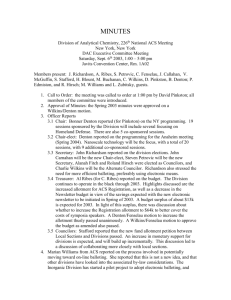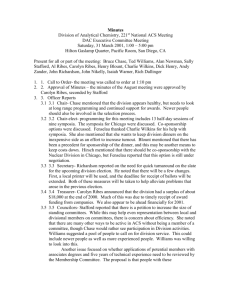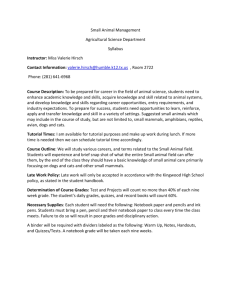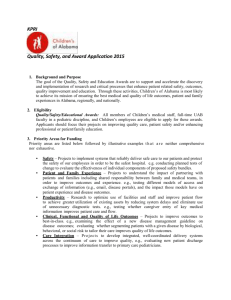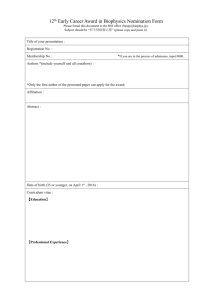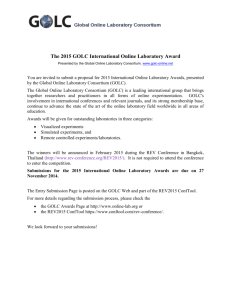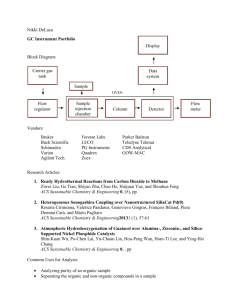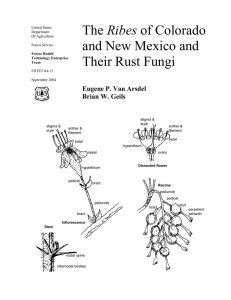Division of Analytical Chemistry, 223rd National ACS Meeting
advertisement
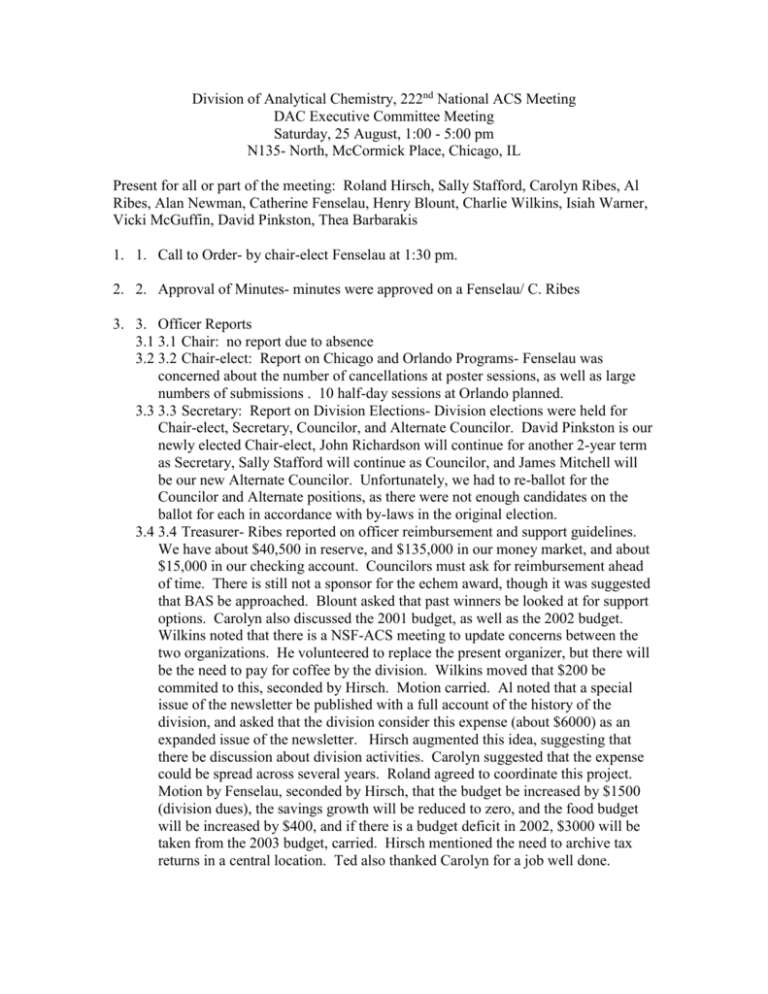
Division of Analytical Chemistry, 222nd National ACS Meeting DAC Executive Committee Meeting Saturday, 25 August, 1:00 - 5:00 pm N135- North, McCormick Place, Chicago, IL Present for all or part of the meeting: Roland Hirsch, Sally Stafford, Carolyn Ribes, Al Ribes, Alan Newman, Catherine Fenselau, Henry Blount, Charlie Wilkins, Isiah Warner, Vicki McGuffin, David Pinkston, Thea Barbarakis 1. 1. Call to Order- by chair-elect Fenselau at 1:30 pm. 2. 2. Approval of Minutes- minutes were approved on a Fenselau/ C. Ribes 3. 3. Officer Reports 3.1 3.1 Chair: no report due to absence 3.2 3.2 Chair-elect: Report on Chicago and Orlando Programs- Fenselau was concerned about the number of cancellations at poster sessions, as well as large numbers of submissions . 10 half-day sessions at Orlando planned. 3.3 3.3 Secretary: Report on Division Elections- Division elections were held for Chair-elect, Secretary, Councilor, and Alternate Councilor. David Pinkston is our newly elected Chair-elect, John Richardson will continue for another 2-year term as Secretary, Sally Stafford will continue as Councilor, and James Mitchell will be our new Alternate Councilor. Unfortunately, we had to re-ballot for the Councilor and Alternate positions, as there were not enough candidates on the ballot for each in accordance with by-laws in the original election. 3.4 3.4 Treasurer- Ribes reported on officer reimbursement and support guidelines. We have about $40,500 in reserve, and $135,000 in our money market, and about $15,000 in our checking account. Councilors must ask for reimbursement ahead of time. There is still not a sponsor for the echem award, though it was suggested that BAS be approached. Blount asked that past winners be looked at for support options. Carolyn also discussed the 2001 budget, as well as the 2002 budget. Wilkins noted that there is a NSF-ACS meeting to update concerns between the two organizations. He volunteered to replace the present organizer, but there will be the need to pay for coffee by the division. Wilkins moved that $200 be commited to this, seconded by Hirsch. Motion carried. Al noted that a special issue of the newsletter be published with a full account of the history of the division, and asked that the division consider this expense (about $6000) as an expanded issue of the newsletter. Hirsch augmented this idea, suggesting that there be discussion about division activities. Carolyn suggested that the expense could be spread across several years. Roland agreed to coordinate this project. Motion by Fenselau, seconded by Hirsch, that the budget be increased by $1500 (division dues), the savings growth will be reduced to zero, and the food budget will be increased by $400, and if there is a budget deficit in 2002, $3000 will be taken from the 2003 budget, carried. Hirsch mentioned the need to archive tax returns in a central location. Ted also thanked Carolyn for a job well done. 3.5 3.5 Councilors: Sally reported that there will be a division councilors caucus. Objectives? See if there are suggestions if there are issues relating to divisions. Wilkins suggested that there is an imbalance between representation by division councilors and local section councilors. He thinks our division councilor votes are diluted. Hirsch elaborated on this. There is financial and representation issues. He also made the point that local section councilors are also division members and consider the needs of divisions. Sally will try to attend the caucus. 4. 4. Subdivision of Chromatography and Separations Chemistry: Vicki McGuffin reported that there is no chair elect, but that she is now candidate for chair elect. There are 5 candidates for the executive committee. There will be a session on polymer separations and characterization organized by the subdivision scheduled for Orlando. They will also be a sponsor HPLC 2002 to be held in Montreal. 5. Committee Reports 5.1 5.1 Program Planning: Chicago program is settled. Orlando: 3 ACS awardees will have symposia with their awards: Analytical Chemistry Fisher award, Field Franklin mass spec award, and separations award. There will be 11 half-day sessions, and a full day session. There will also be another symposium on instrumentation proposed by Henry Blount, for a total of 12 half-day symposia. A program planning committee has been appointed, with the past program planner as the chair. Charlie Wilkins will be the first chair. The first meeting will be in Spring 2002 in Orlando. Some possible ideas for co-sponsored symposia in Boston were proposed, inlcuding one in Diversity in Analytical Chemistry. 5.2 5.2 Awards and Canvassing: Ted Williams reported that there has been confusion regarding the timing for the deadlines for nomination for our division awards. We also need a larger pool of nominees for awards. Funding is also getting tighter, meaning that we have to start to do some fundraising for some of our awards that are in jeopardy if losing funding. Ted asked that anyone ready to suggest a potential sponsor should get in touch with him. 5.3 5.3 Directory: Roland Hirsch suggested that this be removed as an item on the agenda. 5.4 5.4 Education: Barbarakis reported that the Kolthoff program is healthy, and that it was well documented in the spring 2001 newsletter. Awards will only be given at Spring meetings, and that all names of awardees will be given to Fenselau such that all papers will be given in the same symposium. It was also noted that Sibrina Collins, a postdoc with Isaiah Warner, suggested that funding be made available for graduate students who could be identified to present at Pittcon. This is part of an NSF proposal. This could hopefully be expanded to ACS meetings, possibly in conjunction with the Kolthoff Award. The award will be up to $600 per student. Also, it was suggested that there should be plans to support and participate in career-related symposia and workshops offered at EAS meetings since the Findeis Award is no longer given there. 5.5 5.5 Financial Planning: dealt with in the budget discussion. A letter will be drafted to Frank Blum regarding the inconvenience of the meeting site. 5.6 5.6 Graduate Fellowship: there will be 6 full year fellowships and 9 summer fellowships. 5.7 5.7 Membership: We have over 11,000 total new members. 5.8 5.8 Newsletter: Al Ribes suggested that we advertise the benefits and activities of the division as a means of getting and retaining members. Also, we need to let people know how to become more involved in division activities. This might include personal vignettes from active division members. The deadline for the next newsletter is Dec. 1. Ted suggested that we solicit short articles from award winners. Al also reported that he has prepared and submitted an advertisement in Analytical Chemistry on behalf of the Subdivision and Chromatography Subdivision. 5.9 5.9 Web Page: Hirsch gave out a handout of the webpage activities. We currently get about 1000 hits per month. All division abstracts for 2001-2002 are available in the site. There are many educational links, mainly for analytical programs at universities. He also noted that there are many improvements being made to Chemistry.org, several of which are intended specifically for divisions including ours. We will be able to test new functions, such as gated sites for posting division business. Other options could include centralized data for the programming committee, publication of newsletters, and even a membership directory. We may eventually decide to move our website to the Chemistry.org server. At this point, there appears to be no move on the part of ACS to censor what the division posts on the site. 5.105.10 Nominating: no report 5.115.11 Publicity: no report 5.125.12 Regulatory Affairs: to be removed from the agenda 5.135.13 Undergraduate Awards: a report was given in absentia by Howard Dewald. The report focused on the success of the program, but noted that there is frustration regarding loss of forms, and receipt of late forms. As of July 1, a total of 364 awards have been received, out of 650 colleges that were invited to participate. Alan Newman mentioned that a web subscription could be awarded to students as a means of reducing costs to the division. Hirsch suggested that the nomination form be on-line, and that nominations be received on-line and directly entered into a spreadsheet such that no re-keying of information would be required. Fenselau/Ribes moved that $1000 be appropriated to get the nomination process on-line by February 2002. Motion passed. 5.145.14 FACSS: no report. 5.155.15 EAS: Ted reported that attendance continues to be a problem. 6. 6. Reports from Affiliated Organizations 6.1 6.1 ACS Biotechnology Secretariat: Fenselau reported that there are negotiations with this organization for Boston co-sponsorship of programming. 6.2 6.2 DAC-FECS: no report 7. 7. Old Business 7.1 Status of Awards and Awards Funding (especially Electrochemistry): there is still no sponsor for this award. 7.2 Long Range Program Planning Committee: the committee has been formed and will be chaired initially by Wilkins. 7.3 Report on Gordon Conference: Ted Williams reported that attendance was low, but that the quality of the talks was especially high. Pinkston suggested that lack of travel funding probably kept the industrial attendance down. Another possible problem is that there are a large number of meetings on nanotechnology, the subject of the meeting. 8. 8. New Business 8.1 8.1 2001 Annual Report: we had an excellent evaluation overall. 8.2 8.2 Nomination of Candidate for ACS Joint Board/Council on Science: Our division is not eligible to nominate a candidate, so none was nominated. 8.3 Letter of Support for Dr. Percy Julian Video: this has been discussed in advance, and it has our support. 8.4 DAC Involvement in Local and Regional Activities (Les McQuire): Our division needs to become more active in local section acitivties. A committee has been formed to look into this, and some ideas have been suggested. The ACS speaker service was looked at, and there are 90 available analytical chemistry speakers already available. We might be better suited to contributing at regional meetings. Two regional meeting organizers have been contacted who had expressed interest in analytical programming. Carolyn suggested the need for a DAC regional meeting coordinator to work with these people. Other options could be to help to organize and/or sponsor programming at regional meetings, offer short courses, offer student registrations or awards, etc. We could also offer to advertise regional meeting content in our newsletter and website, and possibly fund a keynote speaker. Carolyn noted that we have to watch out for “invading” the territory of the regional activities, though visibility of a “large” division might help to increase attendance. Conversations along this vein will be continued. 8.5 Other New Business: Charlie Wilkins reported on several NSF initiatives. They need increased visibility due to accountability. Congress wants to know what research is carried out via NSF funding and how it affects society. Nanochemistry and Biocomplexity were mentioned as possible funding sites, and our membership should be informed that they should relate their research to these areas. There are also several new programs for funding of international postdoctoral opportunities. 8.6 Hirsch motioned, seconded by Charlie, that a thanks be sent to Bruce Chase for his excellent work as chair.
